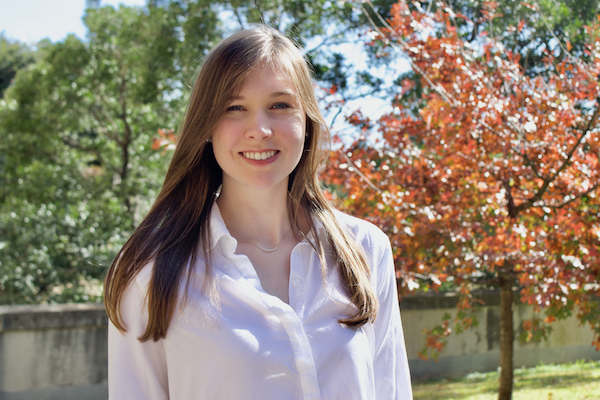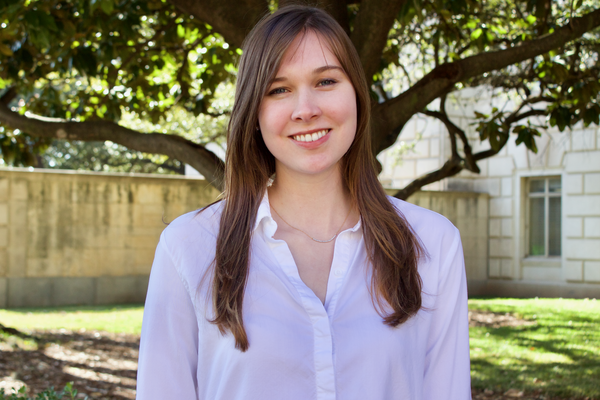Laura Hallas, a Plan II honors, economics and health and society senior at The University of Texas at Austin, is the recipient of a 2019 British Marshall Scholarship.
The Marshall scholarship will fund Hallas’ graduate education at both the University of Oxford, where she will pursue a Master of Science in Evidence-Based Social Intervention and Policy Evaluation, and at the London School of Hygiene and Tropical Medicine, where she will pursue a Master of Science in Public Health.
The scholarship will cover Hallas’ university fees, cost of living expenses, books, thesis research and travel, and fares to and from the United States.
“This scholarship is an incredible honor, but I also feel a real responsibility to use this opportunity to improve public health on the largest scale I can,” Hallas said. “Studying at the London School of Hygiene and Tropical Medicine and Oxford will equip me to deliver on that responsibility.”
As a UT Austin student, Hallas was the editor-in-chief of The Daily Texan, a member of the Texas Orange Jackets and a finalist for the Rhodes scholarship. While earning her bachelor’s degree, Hallas has also been completing a graduate certificate in public health from the University of Texas School of Public Health.
She held internships with the U.S. Department of State, Pathologists Overseas and the Dell Medical School, where she currently works in the Health Leadership Apprenticeship Program helping to address healthcare needs in the community. She also interned with The Dallas Morning News, where she continues to contribute as a freelancer. Last month, the newspaper published a 3,000-word special project piece for World AIDS Day written by Hallas.
“Laura Hallas embodies the multidisciplinary approach to education that strengthens our college,” said Randy Diehl, Dean of the College of Liberal Arts. “As one of our most ambitious student scholars, she bridges the barriers between science and the liberal arts to explore the ways in which public health can improve to benefit the lives of people around the globe.”
The Marshall scholarship, now in its 65th year, is funded substantially through the government of the United Kingdom. The intention of the Marshall scholarship is to “strengthen the enduring relationship between the British and American peoples, their governments and their institutions,” according to the British Marshall Scholarship website. It was founded as a tribute to the Marshall Plan, which was named for former U.S. Secretary of State George Marshall and through which the United States provided aid to rebuild Europe after World War II.
Hallas is the 26th UT Austin student to receive a Marshall scholarship since its establishment in 1953.
Read more about Hallas and her achievements in the Q&A below.

What does winning a Marshall Scholarship mean for you?
As a freshman working both in a hospital and a college newspaper, it’s hard to see how those paths align. At several points in college, I felt like I was pursuing a career path that didn’t exist. But as I have progressed in my education, and planned for graduate school, the relationships between economics and health, writing and policy got clearer every day. To me, receiving the Marshall Scholarship is both confirmation of this
What was your reaction when you found out you’d been selected?
The panel called me to tell me I received the Marshall just as I was leaving class on the South Mall. As soon as I saw the Houston number, I instantly received a total flood of adrenaline. The only coherent thing I could think to do was try and call my parents. They were as shocked as I was —they couldn’t think of much to say besides “wow.”
Keep in mind, at that point I had been working for months on an application that seemed like a pipe dream. In November, I did not even know what country I would be living in the following year. That all changed with a two-minute phone call.
Have you been to the UK before? If not, what are you most looking forward to?
No, I have not been outside the U.S. except for one trip to Hong Kong.
I am honestly looking forward to living in an environment that is just surrounded
What are you passionate about outside of your studies?
I have loved drawing (specifically using pen and ink and watercolor) since I was young. In fact, I briefly considered going to art school instead of UT. I particularly love to draw places I have traveled and am excited to spend more time doing that over the next two years as I explore the UK.
What made you want to study public health?
Like most students who are drawn to health professions, I can trace a lot of my motivation to patients’ stories. But unlike most, my experiences with healthcare occurred far from the bedside. For example, when my grandmother living in New York fell deathly ill, I mostly experienced my extended family’s struggles with health insurance. And when the first Ebola case occurred just miles from my home in 2014, I experienced the public panic by reading the Dallas Morning News.
I wasn’t in the hospital room surrounded by white coats and pill bottles as these two patients were treated. Instead, my view was centered on how economics, policy
Why do you think studying liberal arts is important?
Studying liberal arts grants a kind of mental flexibility that only comes from exposure to multiple fields. Just this semester, I am taking classes in macroeconomics, neuroscience and Latin American history—that is three entirely distinct ways of thinking in a single semester. I know that personally these distinct points of view have made me a better person and student, and I think that having that kind of liberal arts experience is much more enduring throughout a person’s life than any single
What do you think is the most important thing you’ve learned in college?
To build trust in yourself. College is a wellspring of advice and guidance, and it is very easy to join a club or a major. This is great, as it means UT students have choices, but when you are constantly being presented with alternate versions of “you” to choose from, those external voices become deafening.
It has taken me a long time to build up my own instincts and gain a better understanding of what I find important and what I want to accomplish in the world. Even writing the Marshall scholarship applications was a huge opportunity to let me learn about myself and build trust in my own instincts and priorities. It’s learning that won’t show up on any transcript, but it is the most important thing I have learned in college.
What’s your favorite memory from your time at UT?
I will always remember late nights in my office at The Daily Texan. The Texan staff works out of a basement, and every night for a year I would walk down these nondescript concrete stairs and spend hours editing and putting together a page. It was difficult
What is your proudest accomplishment?
As
I brought this to the Texas Student Media director, and within a few months had expanded a partnership with the University Leadership Network, a student success initiative, and Texas Student Media—five entities including The Daily Texan—to create more than 40 new internship positions throughout student media. It was a small, behind-the-scenes change, but one that I was really proud of because it created a lot more permanent opportunity for students to gain experience in media.
What are your goals for the future and your professional life?
I hope to work in global health law with an international health organization such as the World Health Organization (WHO) or Centers for Disease Control and Prevention (CDC)—I plan to return to eventually return to the U.S. and go to law school. I could someday see myself serving as an ambassador or a policy advisor to one of these organizations.
In an increasingly globalized world,
I want to help reverse this trend. I hope to spend my career strengthening global health policy to be more equitable and sustainable, and by communicating the impacts of global health policy to lay audiences through writing. I want to actively affect change in these systems, but also to help the vast majority of people who aren’t immersed in the world global health to understand how their lives—and their wallets—are affected by health policy every day.
